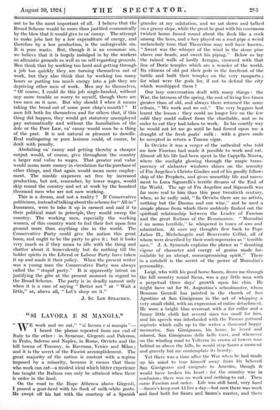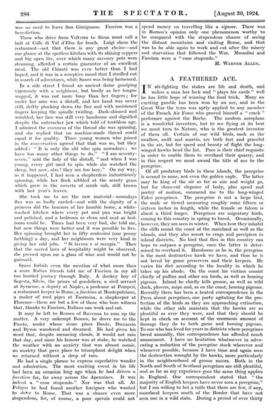"SI LAVORA E SI MANGIA."
• WE work and we eat," " si lavora e si mangia "— I heard the phrase repeated from one end of • Italy to the other : in Syracuse, Girgenti and Palermo, in Pesto, Salerno and Naples, in Rome, Orvieto and the hill towns of Tuscany, in Ravenna, Venice and Milan ; and it is the secret of the Fascist accomplishment. The great majority -of the nation is content with a regime imposed by a minority, because it means that those who work can eat—a modest ideal which bitter experience has taught the Italians can only be attained when there is order in the land.
On the road to the Rupe Athenea above Girgenti, ,I passed a goat-herd with his flock of milk-white goats. He swept off his hat with the courtesy of a Spanish grandee at my salutation, and we sat down and talked on a grassy slope, while the great he goat with his enormous twisted horns fussed round about the flock like a cock among the hens, and a boy played on a reed pipe a weird melancholy tune that Theocritus may well have known. "Sweet was the whisper of the wind in the stone pine above our heads, and sweet his piping." Below us lay- the ruined walls of lordly Acragas, crowned with that, line of Doric temples which are a wonder of the world, Its citizens of old put their gods in the forefront of the battle and built their temples on the very ramparts ;, for what were the gods for, if not to defend the city which worshipped them ?
Our lazy conversation dealt with many things : the War, the lateness of the spring, the cost of living five times greater than of old, and always there returned the same refrain, "We work and we eat." The very beggars had learnt the lesson : they could no longer live on the few soldi they could collect from the charitable, and so in order to eat they had taken to work. In his courtly way he would not let me go until he had forced upon me a draught of the fresh goats' milk : with a grave smile he accepted in return a Tuscan cigar. • In Orvieto it was a verger of the cathedral who told me how Fascism had made it possible to work and eat. Almost all his life had been spent in the Cappella Nuova, where the sunlight glowing through the magic trans- parency of alabaster windows shines on the serenity. of Fra Angelico's Christo Giudice and of his goodly fellow-, ship of the Prophets, and gives unearthly life and move- ment to Luca Signorelli's terrific dreams of the End of the World. The age of Fra Angelico and Signorelli was far more real to him than this poor twentieth century, when, as he sadly said, "In Orvieto there are no artists, nothing but the Duomo and our wine," and he used a simple phrase from which there suddenly flashed out the spiritual relationship between the Leader of Fascism and the great Italians of the Renaissance. "Mussolini un uomo terribile," he whispered in tones of awe and admiration. At once my thoughts flew back to Pope Julius II., Michelangelo and Benvenuto Cellini, all of whom were described by their contemporaries as "terrible men." J. A. Symonds explains the phrase as "denoting vigour of character and energy of genius made for- midable by an abrupt, uncompromising spirit." There in a nutshell is the secret of the power of Mussolini's personality.
Luigi, who with his good horse Sauro, drove me through the hill country round Siena, was a gay little man with a perpetual three days' growth upon his chin. He might have sat for St. Augustine's schoolmaster, whom Benozzo Gozzoli has painted in the church of San Agostino at San Gimignano in the act of whipping a very small child, with an expression of entire detachment. He wore a bright blue overcoat with a fur collar and a funny little cloth hat several sizes too small for him, and his speech was interlarded with the Tuscan guttural . aspirate which calls up to the writer a thousand happy memories. San Gimignano, his home, he loved and adored, San Gimignano delle belle torn, and whenever on the winding road to Volterra its crown of towers rose, behind us above the hills, he would stop Sauro a moment and gravely bid me contemplate its beauty.
Yet there was a time after the War when he had made up his mind to tear himself away from his beloved San Gimignano and emigrate to America, though it would have broken his heart : for the country WM in confusion ; there was no work and nothing to eat. Then came Fascism and order. Life was still hard, very hard —Sauro's keep cost 15 lire a day—but now there was work and food both for Sauro and Sauro's master, and there was no need to leave San Gimignano. Fascism was a benediction.
Those who drive from Volterra to Siena must call a halt at Colic di Val d'Elsa for lunch. Luigi chose the restaurant—not that there is any great choice—and one glance at the spotless kitchen with its shining coppers and big open fire, over which many savoury pots were steaming, afforded a certain guarantee of an excellent meal. The old Chianti was even better than I had hoped, and it was in a receptive Mood that I strolled out in search of adventures, while Sauro was being harnessed.
In a side street I found an ancient dame gossiping vigorously with a neighbour, but busily as her tongue wagged, it was not more busy than her fingers ; for under her arm was a distaff, and her hand was never still, deftly plucking down the flax and with moistened fingers keeping the spindle twirling. Dark-skinned and wrinkled, her face was still very handsome and dignified despite the nutcracker jaw which told of toothless age. I admired the evenness of the thread she was spinning, and she replied that no machine-made thread could equal it for quality. Three young women who joined in the conversation agreed that that was so, but they added : "it is only the old who spin nowadays ; we have too many other things to do." "I am seventy- seven," said the lady of the distaff, "and when I was young, every girl used to spin while she watched the sheep, but now, alas ! they are too lazy." On my way, as it happened, I had seen a shepherdess industriously spinning, while her flock nibbled at the scanty grass which grew in the coverts of scrub oak, still brown with last year's leaves.
She took me to see the raw material—nowadays flax was so badly carded—and with the dignity of a princess did the honours of her humble home, a white- washed kitchen where every pot and pan was bright and polished, and a bedroom as clean and neat as bed- room could be. Times had been very bad, she told me, but now things were better and it was possible to live. Her spinning brought her in fifty centesimi (one penny farthing) a day, and her neighbours were very kind in giving her odd jobs. "Si lavora e si mangia." Then that the sacred laws of hospitality might be observed, she pressed upon me a glass of wine and would not be gainsaid.
• Space forbids even the mention of what more than a score Italian friends told me of Fascism in my all too hurried journey through Italy. A donkey boy of Segesta, Silvio, the prince of gondoliers, a civil servant at Syracuse, a deputy at Naples, a professor at Pompeii, a restaurant keeper in Rome, a facehino at Montepulciano, a maker of reed pipes at Taormina, a shopkeeper at Florence—these are but a few of those who bore witness that, thanks to Fascism, Italians can work and eat: It may be left to Romeo of Ravenna to sum up the matter. A very unkempt Romeo, he drove me to the Pineta, under whose stone pines Dante, Boccaccio and Byron wandered and dreamed. He had given his word that, despite menacing clouds, it would not rain that day, and since his honour was at stake, he watched the weather with an anxiety that was almost comic, an anxiety that gave place to triumphant delight when we returned without a drop of rain.
He had a single phrase to express superlative wonder and admiration. The most exciting event in his life had been an occasion long ago when he had driven a forestiere far, far away across the Apennines. It was indeed a " caso stupendo." Nor was that all. At Foligno he had found another foreigner who wanted to drive to Rome. That was a chance even more stupendous, for, of course, a poor operaio could not spend money on travelling like a signore. There was in Romeo's opinion only one phenomenon worthy to be compared with the stupendous chance of seeing the distant mountains and visiting Rome, and that was to be able again to work and eat after the misery and starvation that followed the War. Mussolini and Fascism were a " caso stupendo."
H. WARNER ALLEN,



































 Previous page
Previous page